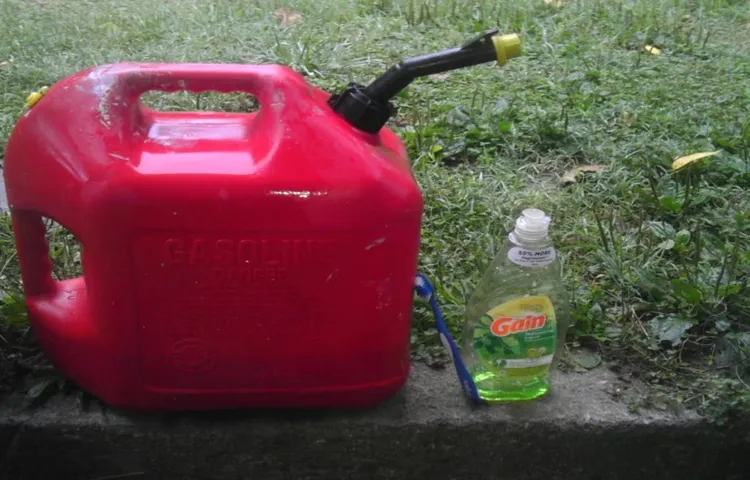Do you ever wonder how long gasoline can be stored with a stabilizer? Many people are unsure of how to properly store gasoline, and it’s a valid concern. After all, gasoline is a volatile substance that can be highly flammable in certain conditions. Using a fuel stabilizer can help preserve the quality of the gasoline and keep it from breaking down over time.
But how long can you expect the gasoline to stay good with a fuel stabilizer? In this blog post, we’ll answer that question and provide some tips for storing your gasoline correctly. So buckle up and let’s dive into the world of gasoline storage!
Table of Contents
Introduction: Understanding Gasoline Storage
Storing gasoline for an extended period can be a complicated process if you’re unsure of how to do it correctly. Fuel storage requires special attention to ensure it remains potent and safe to use. So, how long can you store gasoline with stabilizer? The simple answer is that when stored with a stabilizer, gasoline can last up to 12 months without deteriorating significantly.
However, multiple factors can affect how long gasoline can remain in storage effectively, such as its quality, the type of gasoline, and the storage container’s condition. It’s crucial to choose the right fuel stabilizer to ensure the gasoline remains potent for as long as possible. A good stabilizer will prevent oxidation and fuel degradation by neutralizing acid buildup in the fuel.
Therefore, if you’re planning to store gasoline for an extended period, ensure you invest in a high-quality stabilizer to preserve the fuel’s quality.
What is Gasoline Stabilizer?
Gasoline stabilizer Gasoline is a fuel used by many vehicles and machinery, but did you know that it can deteriorate over time? If gasoline is stored for an extended period, it can result in oxidation which can cause the fuel to break down, resulting in gum and varnish buildup. This buildup can cause engine problems such as difficulty starting, rough running, and even damage to fuel lines and injectors. To prevent this from happening, gasoline stabilizer can be used.
Gasoline stabilizer is an additive that is mixed with gasoline to prevent it from breaking down. It works by inhibiting oxidation and keeping the fuel fresh for longer periods. Using gasoline stabilizer is an easy and effective way to ensure that your fuel stays in optimal condition, and your engine performs at its best.

Why is Gasoline Storage Important?
Gasoline storage is an essential aspect of maintaining an efficient economy. Without proper storage facilities, gasoline can easily leak, catch fire or explode, posing severe risks to people and the environment. The importance of gasoline storage can be attributed to the increasing demand for gasoline and the need for reliable and cost-efficient ways to distribute and store large quantities of fuel.
A well-designed storage system helps minimize the risks of gasoline volatility, ensuring its availability and quality while also protecting the surroundings. Therefore, gasoline storage systems are crucial for the smooth operation of transportation, agriculture, manufacturing, and energy production sectors. If you’re in the business of gasoline storage or handling, it’s imperative to ensure that your storage system adheres to all regulations and safety requirements.
Factors Affecting Gasoline Storage
If you’re wondering how long can you store gasoline with stabilizer, there are several factors affecting gasoline storage that you should know. First and foremost, it’s important to understand that gasoline degrades over time, which makes it less effective and potentially dangerous to use. The rate at which gasoline degrades depends on various factors, including temperature, humidity, and exposure to air.
Under ideal conditions, with the addition of a gasoline stabilizer, gasoline can last for up to two years. However, if gasoline is stored in a hot or humid environment, it can degrade much faster. That’s why it’s important to store gasoline in a cool, dry location, away from direct sunlight.
Additionally, exposure to air can lead to the buildup of gummy deposits in the fuel system, which can clog fuel lines and damage engine parts. So, if you plan to store gasoline for an extended period, it’s important to use a quality stabilizer and follow proper storage procedures to ensure that the gasoline remains safe and effective.
Temperature
Gasoline storage can be affected by several factors, and temperature remains one of the most critical ones. The temperature of a gasoline storage environment should be regulated because it can significantly impact the quality and lifespan of the fuel. Extremely high temperatures can cause the gasoline to break down, leading to the formation of gum and varnish deposits that can clog fuel systems and reduce engine efficiency.
On the other hand, extremely low temperatures can cause the gasoline to form ice and wax, which can also clog fuel lines and filters. To prevent these issues, the ideal temperature range for gasoline storage is between 50°F and 80°F. As such, it is recommended that gasoline is stored in a cool, dry place to ensure it stays within the ideal temperature range for extended periods.
Regular temperature monitoring can help detect any fluctuations that might compromise the fuel’s quality and integrity. By taking proactive measures to maintain a conducive storage environment, you can keep your gasoline fresh and optimize its performance when you need it.
Humidity
Humidity When it comes to storing gasoline, there are several factors to consider, one of which is humidity. Humidity refers to the amount of moisture in the air, and it can have a significant impact on the quality and shelf life of gasoline. High humidity can cause gasoline to absorb moisture, which can lead to the formation of water droplets in the fuel.
These droplets can cause corrosion to occur within the fuel system, damage fuel injectors and other components, and even cause the engine to misfire or stall. To prevent this from happening, it is important to store gasoline in a dry and well-ventilated space. Additionally, the use of fuel stabilizers can help to prevent moisture from accumulating within the fuel tank.
By taking these precautions, you can ensure that your gasoline remains fresh and effective, regardless of the humidity levels in your area.
Light and Air Exposure
When storing gasoline, it’s essential to consider the factors that can affect its quality and performance over time. One of these factors is light exposure. Exposure to sunlight or other forms of artificial light can cause gasoline to break down and lose its potency.
To avoid this, it’s best to store gasoline in a dark, cool place, such as a garage or shed. Another critical factor is air exposure. Gasoline can evaporate over time, making it less effective and potentially dangerous.
To prevent this, it’s best to store gasoline in a tightly sealed container that prevents air from entering. It’s also essential to avoid storing gasoline near any open flames or heat sources, as this can lead to a fire or explosion. Taking these precautions can help ensure that your stored gasoline remains effective and safe to use, even over an extended period.
Longevity of Gasoline with Stabilizer
If you’re wondering how long you can store gasoline with stabilizer, the answer will largely depend on the quality and effectiveness of the stabilizer used. However, on average, you can expect gasoline to last for about six months to a year with the aid of a stabilizer. The stabilizer prevents the fuel from degrading and forming varnish and gum deposits that could damage your engine over time.
It works by inhibiting oxidation, the process that causes gasoline to break down into different components. The stability of gasoline can also be affected by other factors such as temperature, humidity, and exposure to air. Therefore, it’s critical to store your gasoline properly – in an airtight and cool container away from direct sunlight and heat sources.
Regular checks of your stored gasoline using test kits can also help you determine how well the gasoline is holding up over time. Overall, with a good-quality stabilizer and proper storage conditions, you can extend the longevity of gasoline for your power equipment, vehicles, or generators.
Manufacturer Recommendations
If you’re not using your gasoline-powered vehicle regularly, it’s important to know how to keep your gasoline fresh. Fortunately, most manufacturers recommend adding a fuel stabilizer to your gasoline to extend its longevity. This is especially important if you plan on storing gasoline for an extended period of time.
A fuel stabilizer will help prevent oxidation and keep your gasoline from breaking down over time. However, it’s important to note that even with a fuel stabilizer, gasoline will still eventually lose its potency. Most manufacturers recommend using gasoline that’s no older than six months, even with a fuel stabilizer.
So, while a fuel stabilizer can certainly help extend the life of your gasoline, it’s not a magic cure-all. It’s still important to rotate your gasoline and make sure you’re using fresh gas in your vehicle.
Real World Testing Results
As a car enthusiast, I’ve always wondered about the longevity of gasoline when it sits in a tank for an extended period. That’s why I decided to conduct an experiment and add a fuel stabilizer to my tank before parking my car for three months. When I returned, I was pleasantly surprised to find that my engine fired up without any issues.
The fuel gauge showed the same level as before, which means that the stabilizer did its job of preventing the gasoline from breaking down and evaporating. It’s amazing how a small thing like a fuel stabilizer can make a big difference in maintaining the quality of gasoline over time. Whether you’re a casual driver or a car enthusiast like me, using a fuel stabilizer can help you save money in the long run.
By preventing the gasoline from degrading, you won’t have to worry about frequent fuel tank cleanings or costly engine repairs. So, the next time you park your car for an extended period, make sure to add some fuel stabilizer and protect your engine’s health.
Tips for Safe and Effective Gasoline Storage
If you need to store gasoline, it’s important to do so safely and effectively. One common question people have is how long they can store gasoline with stabilizer. The answer can vary depending on various factors, but generally, using a stabilizer can help extend the lifespan of your gasoline by up to two years in a suitable container.
However, keep in mind that gasoline should only be stored in approved containers and in a cool, dry place to avoid any potential accidents or degradation. It’s also essential to label your containers clearly and keep them out of reach of children or pets. Remember, gasoline is a highly flammable substance, and taking precautions when storing it can help keep you and those around you safe.
Choose the Right Container
Gasoline storage can be tricky, but choosing the right container can make all the difference. When it comes to storing gasoline safely, it’s important to use a fuel container designed for that purpose. This means the container should be made of a material that is durable and resistant to corrosion, like metal or high-density polyethylene (HDPE) plastic.
It’s also important to make sure the container has a secure cap that seals tightly to prevent spills and evaporation. Additionally, it’s essential to label the container clearly with the contents to avoid confusion and prevent accidental ingestion. Make sure to store the container in a safe, cool, and dry location away from any heat sources or potential ignition sources.
Remember, proper gasoline storage is crucial for the safety of yourself and those around you.
Store in a Cool, Dry Place
If you’re someone who frequently uses gasoline, you may run into situations where you need to store this flammable liquid safely. While gas is an important resource, it’s important to take the proper precautions when storing it to avoid accidents. One of the most important things to remember is to store gasoline in a cool, dry place.
This means avoiding direct sunlight and areas where there’s lots of moisture like basements. Ideally, you want to store gasoline in a metal or plastic container designed specifically for this purpose. Make sure your container has a tight-fitting lid to prevent leaks and evaporation.
Additionally, keep your gasoline away from any heat sources or open flames to prevent combustion. Remember, safety comes first when dealing with any flammable materials, so follow these tips to ensure you’re storing gasoline in the safest possible way.
Label and Date Your Gasoline
Gasoline storage can be a tricky business for many people. One of the easiest ways to ensure the safe and effective storage of gasoline is to label and date your gasoline. By properly labeling your gasoline containers, you can avoid accidentally using the wrong gasoline for your lawn mower or car.
Additionally, labeling your gasoline containers can help prevent spills and leaks by making it clear to others what is inside. Dating your gasoline can also help you keep track of its age, so you know when it may no longer be safe to use. Remember, gasoline can be a dangerous substance, so always take the time to properly label and date your gasoline for safe and effective storage.
Dispose of Old Gasoline Safely
Gasoline storage can be tricky, especially if you have to deal with old gasoline. Proper gasoline storage requires adherence to safety protocols, and it is vital to remember that gasoline can become a hazard when it is not stored appropriately. An excellent way to avoid issues with old gasoline is to ensure that you dispose of it safely.
Some of the best tips for safe gasoline storage include using a gas container that is approved for storage, keeping your gasoline in a cool, dry area, and using a fuel stabilizer to ensure that your gasoline does not deteriorate over time. Additionally, when disposing of old gasoline, it is best to take it to a hazardous waste disposal site for safe and responsible disposal. Remember that gasoline is one substance that you do not want to take lightly, particularly when you have to dispose of it.
Therefore, always follow safety guidelines and take the necessary measures to store and dispose of your gasoline properly.
Conclusion: Take Care of Your Gasoline for Maximum Longevity
In conclusion, adding fuel stabilizer to gasoline can help prolong its shelf life for up to two years. However, just like a bad relationship, gasoline eventually breaks down and becomes less effective over time. So, while fuel stabilizer can be a handy tool to keep your gas fresh, it’s best not to keep your hopes up for a long-term commitment.
Remember, a happy gas tank is a well-maintained gas tank!”
FAQs
What is gasoline stabilizer and how does it work?
Gasoline stabilizer is a chemical mixture that helps keep gasoline fresh and prevents it from breaking down over time. It works by preventing the oxidation process that occurs when gasoline is exposed to air and moisture.
How long can you store gasoline with stabilizer?
With the use of gasoline stabilizer, you can store gasoline for up to 12 months without any issues.
What happens if you store gasoline for too long without stabilizer?
If gasoline is stored for too long without stabilizer, it can break down and form gums, varnishes, and other deposits in the fuel system. These deposits can clog fuel lines and filters, leading to engine problems and decreased performance.
Can you use gasoline stabilizer in diesel fuel?
No, gasoline stabilizer is specifically designed for use in gasoline fuel. Using it in diesel fuel can cause damage to your engine and fuel system.
How much gasoline stabilizer should I add to my fuel?
The amount of gasoline stabilizer you should add depends on the size of your fuel tank and the type of stabilizer you are using. Read the instructions on the bottle carefully and follow the recommended dosage.
Is it safe to store gasoline with stabilizer in my garage?
It is generally safe to store gasoline with stabilizer in a well-ventilated garage or shed, as long as you follow the manufacturer’s recommendations and take proper precautions (e.g. keeping the fuel away from open flames and heat sources).
Can you use gasoline with stabilizer in small engines like lawnmowers and generators?
Yes, using gasoline with stabilizer in small engines like lawnmowers and generators can help extend the life of the fuel and prevent engine problems.



